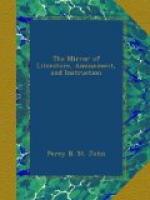One day as he passed a cottage, a face peered at him through an open window; he heard an exclamation of delight, the door opened, and an elderly female ran after him, entreating him to stop; much against the grain he complied.
“’Twas heaven sent you, sir,” said his pursuer, out of breath; “give me for the love of mercy the cure for the rhumatiz.”
“The what?” said Dumps.
“The rhumatiz, sir; I’ve the pains and the aches in my back and my bones—give me the dose that will cure me.”
In vain Dumps declared his ignorance of the virtues of “medicinal gums.” The more he protested, the more the old woman sued; when to his horror a reinforcement joined her from the cottage, and men, women, and children implored him to cure the good dame’s malady. At length watching a favourable opportunity, he insinuated his heel into the side of the piebald, and trotted off, while entreaties mingled with words of anger were borne to him on the wind.
He determined to avoid that green lane in future, and rode out the next day in an opposite direction: as he trotted through a village a girl ran after him, shouting for a cure for the hooping cough, a dame with a low curtsey solicited a remedy for the colic, and an old man asked him what was good for the palsy. These unforeseen, these unaccountable attacks were fearful annoyances to so retiring a personage as Dumps. Day after day, go where he would, the same things happened. He was solicited to cure “all the ills that flesh is heir to.” He was not aware (any more than the reader very possibly may be) that in some parts of England the country people have an idea that a quack doctor rides a piebald horse; why, I cannot explain, but so it is, and that poor Dumps felt to his cost. Life became a burthen to him; he was a marked man; he, whose only wish was to pass unnoticed, unheard, unseen; he, who of all the creeping things on the earth, pitied the glowworm most, because the spark in its tail attracted observation. He gave up his lodgings and his piebald, and went “in his angry mood to Tewksbury.”
I ought ere this to have described my hero. He was rather embonpoint, but fat was not with him, as it sometimes is, twin brother to fun; his fat was weighty, he was inclined to blubber. He wore a wig, and carried in his countenance an expression indicative of the seriousness of his turn of mind.
He alighted from the coach at the principal inn at Tewksbury; the landlady met him in the hall, started, smiled, and escorted him into a room with much civility. He took her aside, and briefly explained that retirement, quiet, and a back room to himself were the accommodations he sought.
“I understand you sir,” replied the landlady, with a knowing wink, “a little quiet will be agreeable by way of change; I hope you’ll find every thing here to your liking.” She then curtseyed and withdrew.




